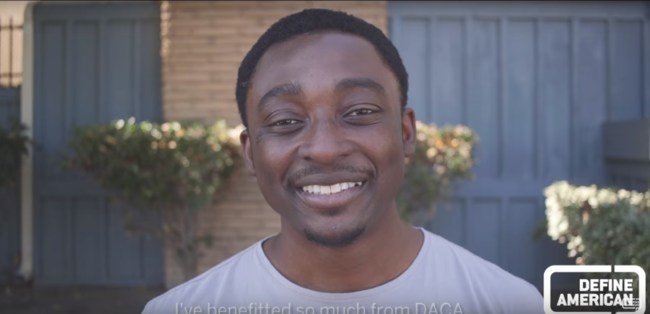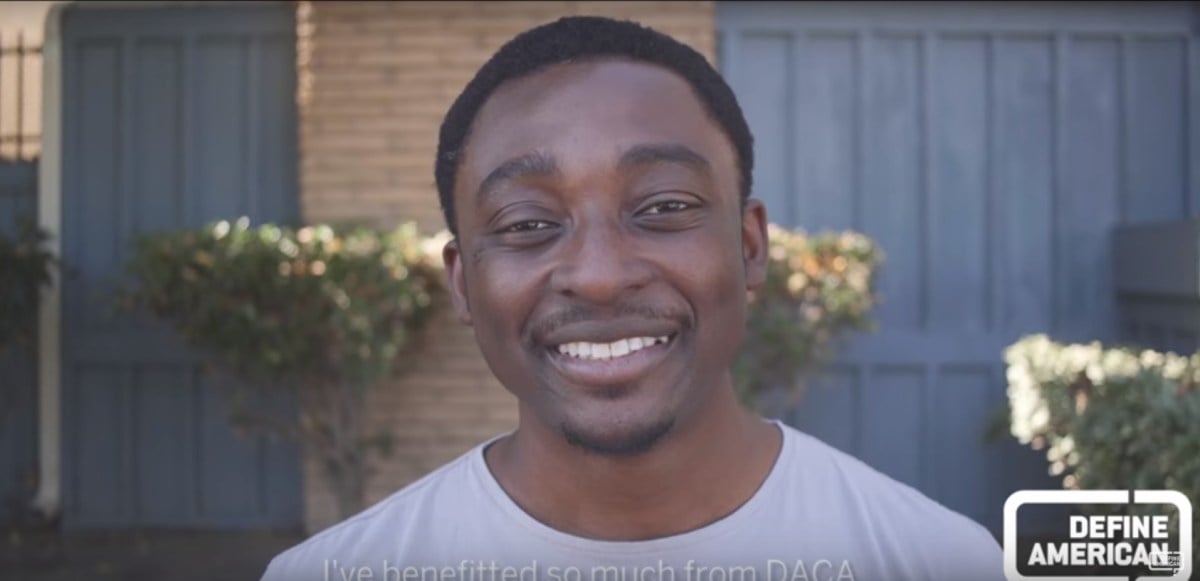The face of immigration is often Latinx, but of the estimated 11 million undocumented Americans there are millions of undocumented folks from other backgrounds who aren’t citizens but who are legally working here under various permits and visas. They include white European immigrants, Asian immigrants, Middle Eastern immigrants, and about 3.7 million foreign-born black immigrants. Actor Bambadjan Bamba from NBC’s The Good Place and Marvel’s upcoming Black Panther is one of them.
In an exclusive interview with The L.A. Times, Bamba decided to come out as undocumented in order to encourage stronger support from Hollywood (and those who consume Hollywood’s stories) of the Deferred Action for Childhood Arrivals Act, or DACA.
DACA provides protection for people who came to the United States as children and meet specific guidelines, deferring legal action against them for a period of two years, which is then renewable. Provided a person has remained in the United States that entire time, was under the age of 16 when they arrived, was under the age of 31 as of June 15, 2012 (when DACA was first implemented), has been or is currently in school, and has never committed a felony, they are allowed to remain in and contribute to the United States, allowing them the time to pursue citizenship in their own time.
Thirty-five year old Bamba fits all that criteria, having come to the U.S. with his family when he was 10, escaping impending hardship in the politically unstable Cote D’Ivoire. It wasn’t until college that he discovered that he was undocumented. Throughout his childhood, his parents were pursuing political asylum. But when he was applying to colleges, and realized he couldn’t get financial aid, he asked his parents about it, and they told him that their asylum case didn’t work out.
“I got into [the Conservatory of Film and Dramatic Arts] and they helped me pay for it,” he said. “I drove yellow cabs in New York City to make the tuition and just kind of did what needed to be done. I just always knew that [acting] is what I was called to do, someway somehow. I figured if I kept working hard at it, if I keep doing the right thing, if I’m super successful, then I’ll become a citizen eventually. That hasn’t happened yet.”

Bamba is coming out as undocumented now specifically because DACA, a program from which he benefits greatly, is in such danger. What’s more, he wants to illuminate the fact that Latinx aren’t the only immigrants creating a home and contributing to the country thanks to DACA. He says:
“Immigrants are not criminals. We’re not here to take away your jobs. We’re here to give back. We’re not just Mexicans or Latino. We’re black, too. We’re from the Middle East, from Asia, too. We’re your neighbors, your doctors, the teachers of your children, and sometimes we’re on TV in your home, characters that you love. We’re just one of you.”
He speaks very specifically about his own industry, entertainment, saying that it wouldn’t be able to function in the same way without the contributions of undocumented workers. This is an especially poignant point when you consider all the talk about “diversity” and “inclusion” in Hollywood. It would be impossible in many instances to be true to that goal without hiring non-citizens, be they citizens of other countries on work visas, or undocumented Americans.
Yet even so, and even though he and many others are working here legally under DACA, there is a fundamental lack of understanding by citizens of the immigration process and how it even works.
Bamba explains, “A job that I just did, we shot on Friday, shot the entire scene. It was beautiful and the director liked me. Everything was great. On Saturday, they’re like, ‘We don’t understand this paper. Where’s your visa?’ I’m like, ‘I don’t have a visa. I’m DACA.’ ‘Well, what’s DACA?’
You try to break it down to them. They’re freaking out, calling [my manager] like, ‘Oh my God. I’m going to lose my job. I’m going to get fired because he’s already on camera…'”
He makes it a point to say that he understands that this isn’t malicious. It’s that the immigration process needs to be demystified for most people. “Honestly, in the heart of their hearts, I know that they’re supportive of immigrants,” he says. “It’s just frustrating when people are scared when they see these documents. Yes, the immigration system is complicated, but people are here working legally. Booking the job is really the hardest part, so your documentation afterwards should be simple…”
If you’d like to join in the fight to stand up for undocumented people in this country who are, indeed, contributing legally to this country (no matter what ill-informed racists might tell you), head on over to Define American to learn more about what you can do and how you can stand with immigrants like Bamba, human beings who deserve respect and care in exchange for their contributions to our shared home.
(image: screencap)
Want more stories like this? Become a subscriber and support the site!
—The Mary Sue has a strict comment policy that forbids, but is not limited to, personal insults toward anyone, hate speech, and trolling.—









Published: Nov 29, 2017 06:16 pm